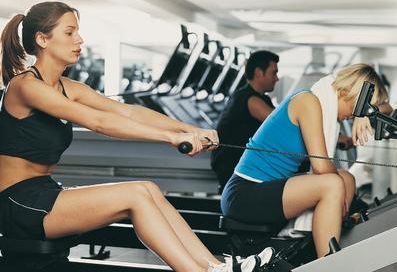
Are we exercising too much?

As a business owner of a Pilates studio, I get asked this question very often: How often should I workout?
A lot of people are concern about not working out enough, but is there such a thing as overtraining? How much is too much and how much is too litle. As a society we’re all about effeciency, productive and results. What then is this magical number that we are looking for?
Say you’re working out on a very regular basis, going for runs on Monday and Wednesday, Pilates on Tuesday, weight training on Friday and yoga on Saturday and Sunday. You’re thinking, thats right! I’m working out, I’m going to look hot in that dress or in that skinny jeans you just bought last week.
The question is, what are your goals for working out? Whether you want to put on muscles, get lean, add strength, or just maintain, the amount of times per week that you train can be a direct correlation to your results.
As a general rule, if you’re looking for any sort of results, we strongly recommend that you don’t spend any less than three days per week working out. You won’t be accomplishing anything by training less than this, and your weekly training volume will simply be too low, which won’t have lasting effects on strength, muscle volume, or caloric burn.
But perhaps, too much of a good thing may not be great. So, how do we know we are working out too much? Here are our top 5 common symptoms to look out for.

1. Muscle Soreness
It’s normal to have muscle soreness for a day or two following a workout. However, if you’re still sore past the 72-hour mark, be sure to schedule a break and rest. This type of extended soreness is a sign your muscles aren’t recovering and negatively impacts on your muscle-building efforts.
2. Insatiable Thirst
Do you frequently have an unquenchable thirst? Are you starting to believe that no matter what you drink, you’ll still crave more? If this happens to be coinciding with a period of increased gym-time activity, there’s an excellent chance that you’re overtraining, which causes the body to be in a catabolic state. This states naturally causes dehydration and thirst is one of the first signs of dehydration. To combat this, you would need to drink adequate water before, during and after gym as well as adequate rest.
3. Insomnia
Is your gym time increasing, while at the same time you’re having difficulty sleeping? It’s most likely a result of a combination of nervous system and or hormonal system overload. Try to focus more on getting your 10 pm to 2 am sleep because this is the part of your sleeping pattern where physical restoration occurs, your body grows while resting, not training.

4. Injury Increase
Getting injured more often? In particular, are you re-aggravating old injuries? If so, hop on over to Breathe Pilates and we will fix you (just kidding), you may be overtraining. Why is this so? Because your body doesn’t get enough time to recuperate between workouts meaning that at some point you begin “training in a weakened state” To prevent yourself from overtraining, try add forced rest periods into your routine, as well as changing training intensities or enjoying active recuperation sports that are low intensity and completely different from weights and cardio.

5. Halted Progress
Has your body stopped changing in spite of your best efforts? If so, you may be overtraining. When you’re overtraining your body is kind of going in the opposite direction of growth because what’s happening is that your muscles are torn and all you’re doing is re-tearing them again. Don’t risk possibly entering into a muscle-burning phase. Remember: Muscles need a chance to repair and that’s only possible when your body is given the proper time to rest and recover before being forced into more exercise.
So, how do we fix this? and what is the best way to make sure that you do not over exercise? Go easy on yourself. Work often but monitor your resistance. It might be the best way to run faster, find more power on the bike, climb effortlessly, and pull off unimaginable feats of strength and endurance.
1. Listen to and feel your body
Nobody knows your body better than you do. To use it effectively, you need to take time to stop and feel your body. When you are stressed, the only thing you can feel is tension. It is only when you relax that you can start to feel what your body is telling you. From here, you can start working with your body, rather than against it. What you feel is not immaterial. It’s not something to push past. Try trading that assumption in for a better one. Assume that what you have done is enough, and if you learn enough about you, you can achieve through peace far more than what is gained in war.
2. Respond to your body
If you feel tension in any part of you, relax. If you feel something disconnected in your body, stop what you are doing. If you can’t move a part of your body very easily, slow down and take an interest in that, and see what you can do to help make it part of the team. When parts of your body are tense, strained, disconnected, or not happy to move, you’re working against yourself. When every part of you moves in a harmonious concert, you are – by your nature and the fact that you are here – an incredibly high-performance machine.
3. Repeat
This way of being doesn’t happen overnight. It’s part physical training, and part reorienting your psychology around a powerful belief that you can achieve very great things without suffering. So it might take some time, some practice. But you will notice right away when it kicks in during a run, a long uphill on bike, or scaling whatever mountainous challenge you happen to be up against.
When you know your way around you, you’re going to knock your own socks off. You’re going to have loads of fun seeing things that are supposed to be “hard” just happen for you. No force, no struggle, just doing it.
Share — Facebook Twitter
 WHATSAPP
WHATSAPP


